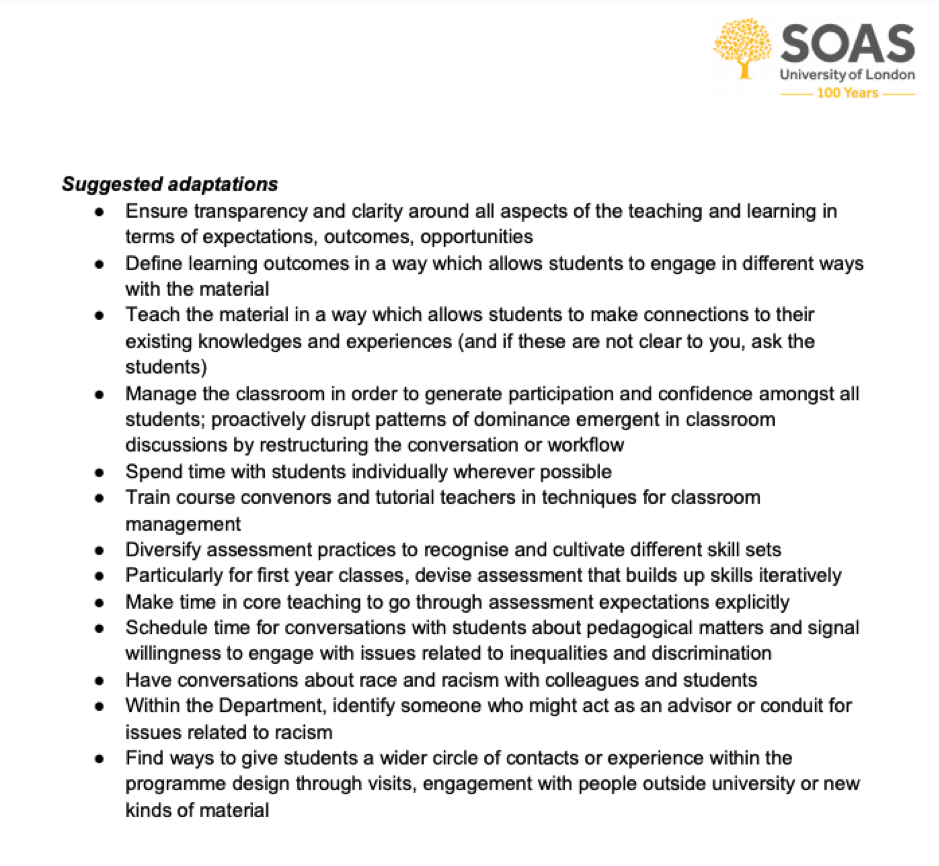Thread..
Decolonising in education isn’t just the curriculum. Yes – *what* we teach is the core to many, but *how* we teach, and *who* teaches can potentially reinforce inequality, solidify existing privilege and cut off the potential closing of attainment gaps. (1)
Decolonising in education isn’t just the curriculum. Yes – *what* we teach is the core to many, but *how* we teach, and *who* teaches can potentially reinforce inequality, solidify existing privilege and cut off the potential closing of attainment gaps. (1)
[Digression – of course – the form and content aren’t so neatly disaggregated in reality. What we teach and how we teach it intertwine in complex ways in the production of meaning, learning and student competencies] (2)
There *is* some literature on decolonizing practice in terms of pedagogy. ‘Reinventing critical pedagogy as decolonizing pedagogy: The education of empathy’ by Michalinos Zembylas - https://doi.org/10.1080/10714413.2019.1570794 is an interesting take on decolonising the idea of ‘empathy’... (3)
But like much of the ‘decolonising pedagogy’ literature, does not have the practical edge that much of the ‘decolonising the curriculum’ material does.
Closer to home, I looked to the Decolonising SOAS Learning and Teaching toolkit https://blogs.soas.ac.uk/decolonisingsoas/files/2018/10/Decolonising-SOAS-Learning-and-Teaching-Toolkit-AB.pdf (4)
Closer to home, I looked to the Decolonising SOAS Learning and Teaching toolkit https://blogs.soas.ac.uk/decolonisingsoas/files/2018/10/Decolonising-SOAS-Learning-and-Teaching-Toolkit-AB.pdf (4)
There is concern about how toolkits make the decolonising process overly ‘tick-box’ & complied with at only surface level, but I approached this one with optimism. Phew – after the section on your content, and the ways you might reflect on and amend that, it moves to pedagogy (5)
I like p14 stating: “Questions of inclusive pedagogy can be difficult for academics in particular to grasp, given that many of them have been high-achievers academically, may experience the present systems to be broadly fair and meritocratic, traditionally fit a different.. (6)
...kind of demographic profile, and are now so used to academic practices and language that most of it seems totally transparent and natural.” – It then makes a set of suggested adaptations – which I think are good. (7)
Of these – the one that struck me was: ‘Manage the classroom in order to generate participation and confidence amongst all students; proactively disrupt patterns of dominance emergent in classroom discussions by restructuring the conversation or workflow’ - but **how**? (8)
A twitter thread isn’t the place to fully explicate the variety of ways a tutor might do this – but it seems full of potential to me. To find ways to ensure all voices are heard. To de-centre to tutor’s voice and disrupt conventional power dynamics (9)
. Some of these are relatively straightforward to implement, allowing students to contribute/questions via a variety of means (speaking in a debate, comments via a Padlet, collective group replies via post-its, asynchronous Q&A contributions, etc – all as part of the same... (10)
...discussion. Others are controversial – such as progressive stacking ( https://twitter.com/timeshighered/status/923175571009495040?s=20). I’ll try and write more about the options, and the benefits, pitfalls and disadvantages of each, in a lengthier piece – but I really started this thread to make a simple point.. (11)
Decolonising the curriculum is only part of the process. The ‘how’ of our teaching has huge impacts, and should be a nexus of decolonisation that receives as much of our reflection and recalibration of practice as the ‘what’ we put into our curriculum
(12 - end!)
(12 - end!)

 Read on Twitter
Read on Twitter


